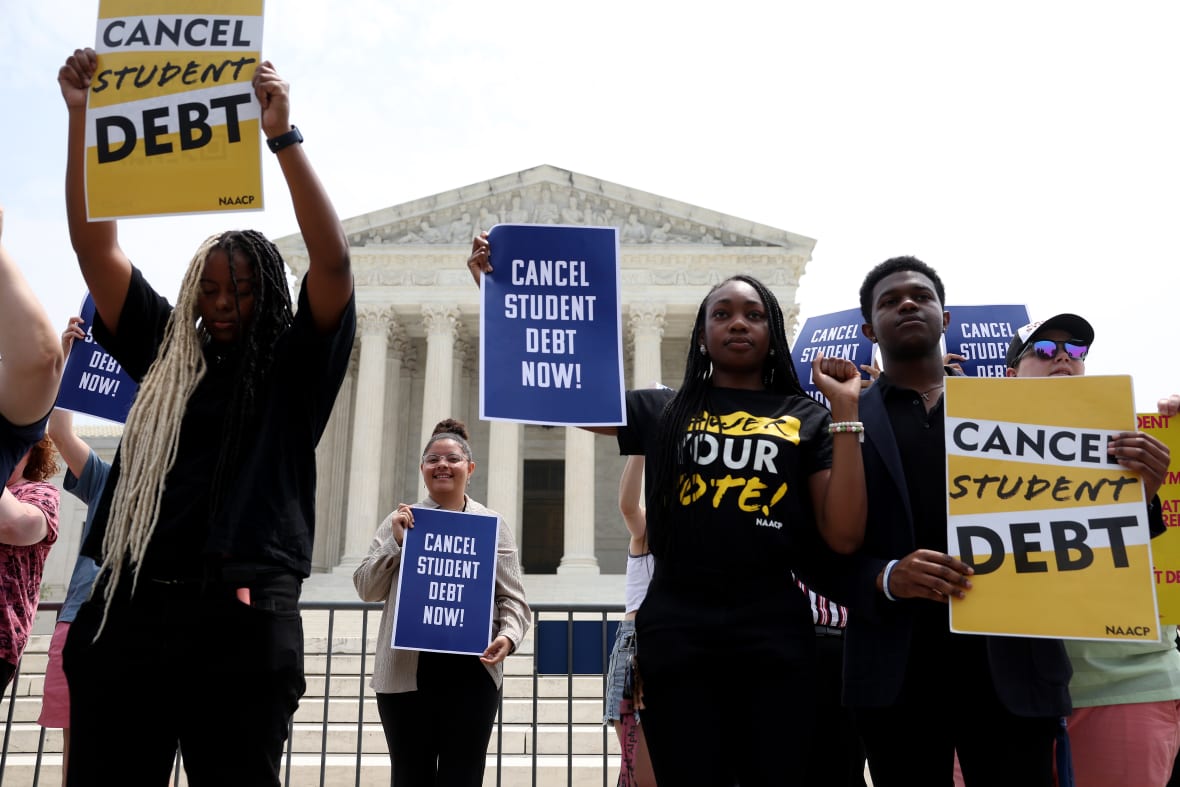While Black and brown student loan borrowers still were reeling from the Supreme Court’s decision to strike down President Joe Biden’s education debt forgiveness program, the president announced countermeasures that will reduce monthly loan payments and delay reporting delinquent student loan accounts.
The Court’s ruling sidetracks the Biden-Harris administration’s efforts to improve the economic health of Black Americans. But within hours of the high court’s decision, the president announced a multi-faceted plan to provide critical economic relief for student loan borrowers.
When the White House unveiled its student relief program that would cancel up to $20,000 in debt for eligible borrowers, the administration noted the initiative would significantly close the wealth gap between Black and white Americans.
“Black student borrowers are more likely to have student debt due greatly in part to the discrimination that limited wealth creation,” said Andre Perry, an economic researcher and senior fellow at Brookings Institution, which conducts nonpartisan research on global, national and local policies.

Perry told theGrio that by striking down Biden’s plan to cancel student debt for up to 43 million borrowers, “the Court turns a blind eye to why so many Black people have greater debt.”
President Biden’s new actions after Supreme Court student debt ruling
In responding to the Supreme Court ruling that he described as “disappointing,” Biden acknowledged that many borrowers likely feel “a little bit angry.” He added, “I must admit I do too.”
The plan he revealed Friday appeared to be an attempt to salvage his effort to give borrowers a way to navigate the student loan debt crisis in the absence of his estimated $430 billion debt relief program.
One component of the plan that the administration named SAVE, for Saving on a Valuable Education, reduces monthly student loan payments. Under the Department of Education’s Income-Driven Repayment Program, borrowers pay 10% of their discretionary income toward their undergraduate loans. Biden’s new plan reduces that to 5%.
A White House fact sheet asserted that the updated income-driven repayment plan will “cut borrowers’ monthly payments in half, help the typical borrower save more than $1,000 per year on payments, allow many borrowers to make $0 monthly payments, and ensure borrowers don’t see their balances grow from unpaid interest.”
The president also announced that Education Secretary Miguel Cardona initiated a new rulemaking process under the Higher Education Act to provide an “alternative path” to debt relief for as many working and middle-class borrowers as possible.
However, Biden emphasized that the rulemaking process would take considerable time. Additionally, eligibility for that relief and its potential savings remain unclear.
Meanwhile, to mitigate the strain of making loan payments, the White House also unveiled a plan to “on-ramp” repayment of student loan debt with a temporary 12-month program in which the Department of Education declines reporting delinquent borrowers to credit bureau agencies. However, interest still will accrue on loans. The program will run from Oct. 1, 2023 to Sept. 30, 2024.
Borrowers can learn more information about the new programs and sign up at StudentAid.Gov.
Student debt cancellation and closing the racial wealth gap
As the Biden-Harris administration works to secure relief for borrowers in the absence of its student debt program, civil rights groups and advocates remain incensed by the Supreme Court’s ruling.
NAACP President Derrick Johnson told theGrio, “This is perhaps the most corrupt Supreme Court in history.”
Johnson noted that in addition to the student loan decision, the high court also “ruled to limit access to voting, therefore suffocating our democracy,” and on Thursday ruled to “ban affirmative action.”
“The real question for the Supreme Court is, ‘What is ultimately its goal?’” asked the civil rights leader, before adding, “These political decisions are inconsistent with precedent and inconsistent with a thriving, functioning democracy.”
Johnson said President Biden’s student debt program would’ve been critical in closing the racial gap.
“Student loan debt is one of the largest debts that African Americans have, bar none,” he told theGrio.”We know in this country, the number one wealth creator is homeownership and small businesses, but you cannot go into homeownership or become a small business owner if you’re saddled with debt.”
When asked by theGrio during Friday’s press briefing if the White House believed its economic policies or the new actions could have a significant effect on closing the racial wealth gap, Deputy Director of the National Economic Council Bharat Ramamurti acknowledged the economic disparities for Black borrowers as a “serious issue.”
“That is one of the many reasons why the president pursued this debt relief pathway, and he’s continuing to pursue this alternative pathway now,” he said.
Ramamurti cited data showing that Black borrowers often have to borrow more money for higher education, and it takes them longer to repay because “they have less family wealth.” He also said data shows that Black borrowers are also “helping other people in their family pay off their debts.”
Days before the Supreme Court’s ruling, Jared Bernstein, chair of the White House Council of Economic Advisors, told theGrio that regardless of the outcome of the student loan legal battle, President Biden’s policies have been intentional to drive equity in education, including investing in HBCUs, increasing Pell Grants and improving the income-based repayment program.
“We’ve made this much more affordable to student borrowers, and that, again, disproportionately will help Black debtors,” said Bernstein.
In his remarks on Friday, President Biden said that many Americans had hope that student debt relief would soon be a reality, but the Supreme Court’s ruling “[snatched] it away from them.”
“Today’s decision has closed one path. Now we’re going to pursue another,” said Biden, who vowed, “I’m never going to stop fighting for you.”
He added, “We’ll use every tool at our disposal to get you the student debt relief you need and reach your dreams. It’s good for the economy. It’s good for the country.”
Gerren Keith Gaynor is a White House Correspondent and the Managing Editor of Politics at theGrio. He is based in Washington, D.C.
TheGrio is FREE on your TV via Apple TV, Amazon Fire, Roku and Android TV. Also, please download theGrio mobile apps today!

